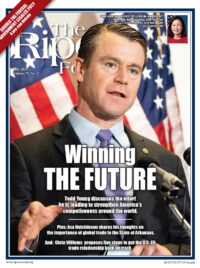 Throughout the last century, the United States has led the world as a result of our scientific discoveries, technological innovations, and, ultimately, through the values that guide how these technologies are utilized.
Throughout the last century, the United States has led the world as a result of our scientific discoveries, technological innovations, and, ultimately, through the values that guide how these technologies are utilized.
As Americans, we are driven by a deep need to lift one another, to discover breakthroughs that will lead to a better life for all. In the 20th century, Vannevar Bush beautifully captured the essence of America’s culture of discovery and innovation when he first coined the memorable term, “Endless Frontier.”
Over the last century, developments such as landing a man on the moon, the invention of the internet, and, most recently, the creation of multiple vaccines for COVID-19 have been the result of government-led investments that have transformed our world. These breakthroughs and the many related inventions have resulted in an improved quality of life, increased opportunities, and broadened prosperity around the globe.
Today, our leadership is being challenged by a state capitalist regime in Beijing that threatens to win the next century by dominating the critical technologies that are bound to shape it. The decades ahead will be some of the most complex and challenging that we have ever faced as a nation.
Today, our leadership is being challenged by a state capitalist regime in Beijing that threatens to win the next century by dominating the critical technologies that are bound to shape it.
The Chinese Communist Party is pursuing investments to advance its authoritarian agenda, to compete with the United States, and to undermine democracies around the world. The Chinese Communist Party has adopted a state capitalist economic model fueled by labor exploitation, intellectual property theft, and significant investment in the technologies essential to present-day economic and military leadership.
The Chinese Communist Party’s plan of “Made in China 2025” is its formal effort to boost China’s role in the world and our dependence on them for the technologies of the future. The technology areas that China has identified include: high-end robotics, biopharma and high-tech medical devices, next generation IT systems, advanced energy, and more.
The winner of this race stands to benefit from the trillions of dollars that will result from the development. These technologies are also critical because of the way values are woven into how they are utilized. As we have witnessed, the Chinese Communist Party is already using technology to oppress those in Xinjiang and Hong Kong. As it works toward new advancements, they will, undoubtedly, continue to use them to achieve their authoritarian goals.
Make no mistake, the country that wins the race in key technologies — such as artificial intelligence, quantum computing, advanced communications, biotechnology, and more — will be the superpower of the future.
In recent years, the United States has been largely playing defense against the Chinese Communist Party’s investments. As an example of some of the defensive actions taken, the Justice Department has ramped up law enforcement to counter the theft of U.S. technology, controls have been tightened over dual-use exports, and we have worked to dissuade foreign governments from installing Chinese products in their 5G networks. These activities are important and must continue, but more is required.
It is time for the United States to go on offense by passing the bipartisan Endless Frontier Act, which would solidify U.S. leadership in scientific and technological innovation through increased investments in the discovery, creation, and manufacturing of technology critical to national security and economic competitiveness.
History reminds us that the United States has made bold investments before that have transformed our economy and our geopolitical position.
For example, the Space Race began in 1957 with the unanticipated Russian success of Sputnik 1. A year later, President Eisenhower signed the National Aeronautics and Space Act, establishing NASA. President Kennedy then committed the nation to land a man on the moon. Ultimately, we would spend the equivalent of $140 billion in today’s dollars to fulfill that mission. The success of NASA would lead to spin-offs in hundreds of new products, new industries, and American leadership in aerospace itself. Today, U.S. dominance in aerospace contributes $2.3 trillion in GDP to the U.S. economy, including $143 billion in exports annually — more than the entire investment to put a man on the moon over a decade.
The country that wins the race in key technologies — such as artificial intelligence, quantum computing, advanced communications, biotechnology, and more — will be the superpower of the future.
The Interstate Highway System is another bipartisan project that in 1956, cost $10 billion. In today’s dollars that cost would be $96 billion. Forty years later, a 1996 report said the system had “a profound effect upon the American economy and contributed significantly to improved economic efficiency and productivity.” Forty years from now, I believe the same will be said about the technologies funded through the Endless Frontier Act.
Some will argue that we should leave it to the private sector to decide our fate. The private sector is clearly a critical component, but it is also insufficient on its own.
Some of the technologies destined to shape American’s economic and geopolitical future will not provide near-term quarterly returns to shareholders. These technologies also exist beyond the time horizon for venture capital interests.
As a result of this dynamic, the Endless Frontier Act will generate more private sector economic activity by de-risking investment into critical emerging technologies.
The government’s role of funding basic research is crucial to the development of critical technologies by exploring scientific concepts that entrepreneurs can experiment with to discover and develop products and technologies that have commercial viability. This partnership has produced some of our most innovative companies, including Genentech, Google, and Moderna.
Additionally, the share of domestic basic research funded by the United States’ federal government has declined in recent years, while China has increased R&D investments into critical and emerging technologies approximately thirtyfold over the last 25 years.
Accordingly, it is in our national interest to pair strategic public bets in key technologies with private investment as we look to lead the world into the 21st century. History tells us that government can catalyze American innovation by boosting fundamental research investments.
While our public sector can focus our nation on identifying and developing these new technologies, the Endless Frontier Act will help ensure that these new technologies do not remain in a lab, but rather have a path toward commercialization woven into them from the very beginning.
We must act now to develop technologies that give the world an alternative to China’s offerings. The bipartisan Endless Frontier Act is the way to do that. If we’re successful, we will not only out-compete, out-innovate, and out-grow the Chinese Communist Party, but will also ultimately win the future.
Todd Young serves as the Senior Senator from the State of Indiana.




